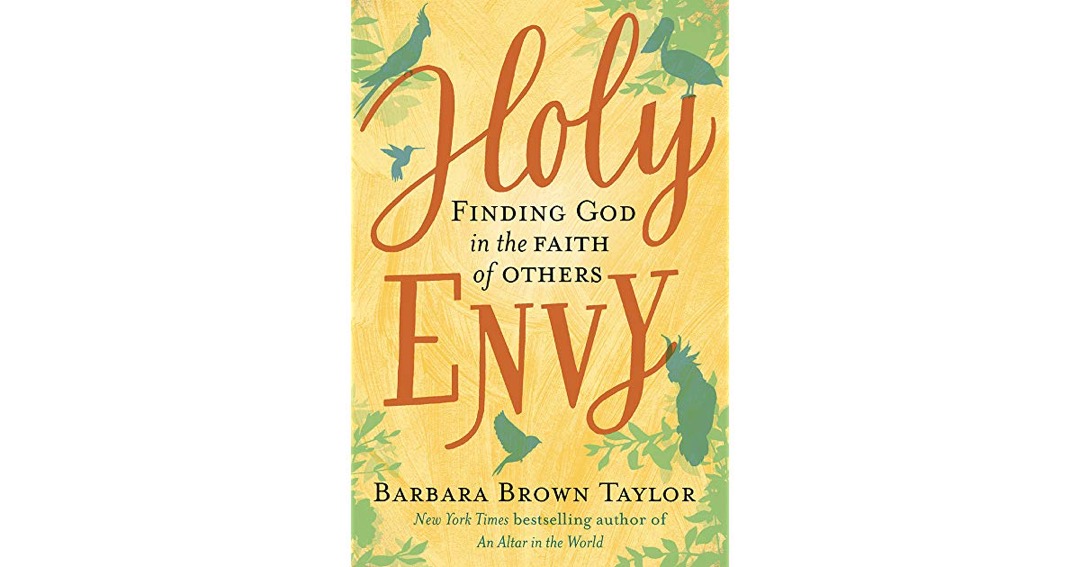HOLY ENVY, by Barbara Brown Taylor
Harper One 2019
By the Reverend Deacon Rob Roi
“No one owns God” is explained by Barbara Brown Taylor in her book Holy Envy. She writes that we are not born with a belief system or a worldview. We get these from our elders, along with our DNA. She believes that what we have in common is not our religion but our humanity.
Taylor continues her spiritual journey begun in leaving the church to find out what the world looks like after taking off her Episcopal clergy collar. In Holy Envy, she contemplates the countless ways other people and traditions encounter the Transcendent, both by digging deeper into those traditions herself and by seeing them through her students’ eyes as she sets off with them on field trips to monasteries, temples, and mosques. In 1998, she began teaching world religions at Piedmont College, which she expected would help her learn the subject matter. What she did not expect, though, was that the classes and students would challenge and deepen her own Christian faith.

Taylor believes that God created variety over uniformity, that God created conditions for many interpretations, and that there is no longer one way to say a true thing.
The theme of the Bible, Taylor shows, is this all-abiding love for the religious stranger, for our neighbours of other faiths. We shouldn’t fear learning more about their relationships with the divine, because their understanding will lead to greater understanding for ourselves, and will enrich our own relationship with God.
The author writes, “The only clear line I draw these days is this: when my religion tries to come between me and my neighbour, I will choose my neighbour…Jesus never commanded me to love my religion…treat every human being as if he or she were Jesus in disguise.”
Finding God in the Faith of Others
HOLY ENVY, by Barbara Brown Taylor
Harper One 2019
By the Reverend Deacon Rob Roi
“No one owns God” is explained by Barbara Brown Taylor in her book Holy Envy. She writes that we are not born with a belief system or a worldview. We get these from our elders, along with our DNA. She believes that what we have in common is not our religion but our humanity.
Taylor continues her spiritual journey begun in leaving the church to find out what the world looks like after taking off her Episcopal clergy collar. In Holy Envy, she contemplates the countless ways other people and traditions encounter the Transcendent, both by digging deeper into those traditions herself and by seeing them through her students’ eyes as she sets off with them on field trips to monasteries, temples, and mosques. In 1998, she began teaching world religions at Piedmont College, which she expected would help her learn the subject matter. What she did not expect, though, was that the classes and students would challenge and deepen her own Christian faith.
Taylor believes that God created variety over uniformity, that God created conditions for many interpretations, and that there is no longer one way to say a true thing.
The theme of the Bible, Taylor shows, is this all-abiding love for the religious stranger, for our neighbours of other faiths. We shouldn’t fear learning more about their relationships with the divine, because their understanding will lead to greater understanding for ourselves, and will enrich our own relationship with God.
The author writes, “The only clear line I draw these days is this: when my religion tries to come between me and my neighbour, I will choose my neighbour…Jesus never commanded me to love my religion…treat every human being as if he or she were Jesus in disguise.”
The official communications channel of the Anglican Diocese of Niagara.
Keep on reading
Resurrection of Hope in Thundering Waters
Of Pancakes and Ashes
Into the Desert with Christ: Why Lent Still Matters in a Frantic and Fractured World
YLTP Registration Now Open Calling All Young Leaders of Niagara!
Every Day is Christmas: Finding Grace in the Midst of War
The Grandparents Club: A New Faith Formation Resource for Churches